
7+ Accounting Journal Templates in PDF
Accounting is a tough job to do. An accounting journal helps to ease this task a little. Such journals are…
Apr 04, 2023
Critical thinking is a huge part of a person’s mental framework. It is being trained and nurtured while in school. Students write journals for them to exercise their thinking and writing skills. They are given a certain topic to analyze and their subjective response is drawn from it. One kind of journal that serves such a purpose is the dialectical journal. You may also check out word journal templates.

A dialectical journal is a kind of journal that tests a person’s critical thinking. It is usually used in literature and other classes that require analysis. Taken from the word “dialectic”, it is a form of intellectual investigation. It is arriving at a truth using a question and an answer. He is made to understand a literary piece and write his own thoughts about it. There are no right or wrong answers when it comes to these kinds of journals. It is also used to record behaviors and observations.
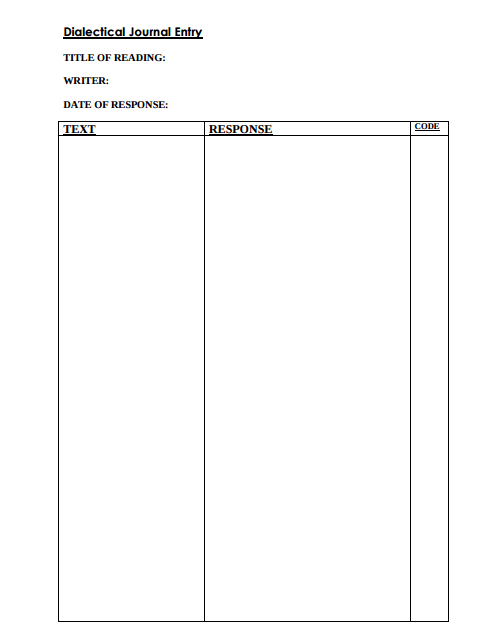
writingintheie.info
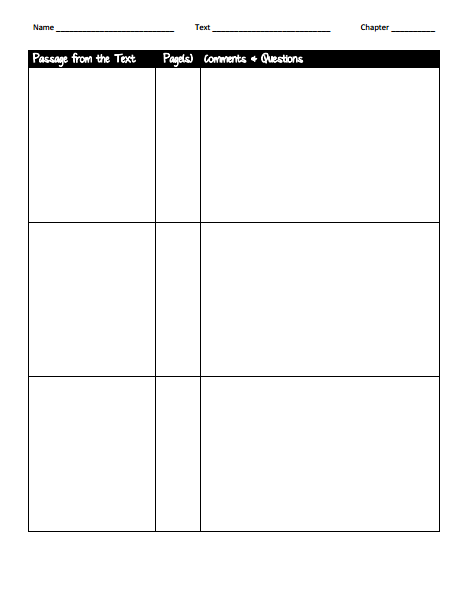
whs.willisisd.org
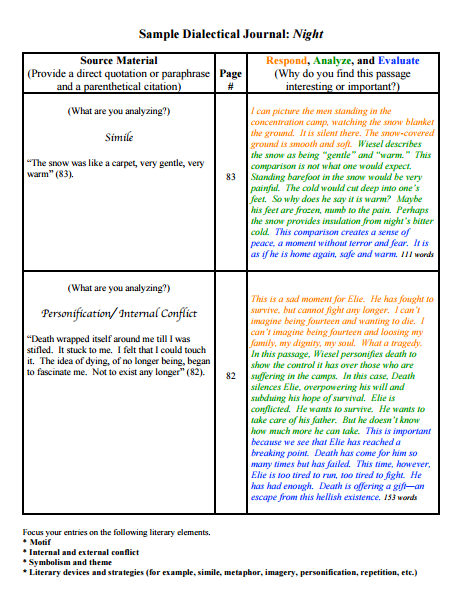
hrsbstaff.ednet.ns.ca
Dialectical journals are written to make people think more critically about a given passage. When a certain passage strikes some inner and suppressed feelings within you, the response you write ends up being more critical and emotional at the same time. Observations and reactions are also recorded in dialectical journals, as these are essential in critical thinking. Analytical reasoning is also developed through these kinds of journals. You may also check out notebook journal templates.
Students in middle school also get to use dialectical journals. It trains them to think critically and analytically. It is a useful tool in analyzing literary pieces and events in history. Subjects with a heavy emphasis on academic discipline use dialectical journals to train the analytical thinking of the students. You may also see journal planner templates.
Dialectical journals are used to arrive at a truth that both parties have never seen before. To do that, there has to be logical arguments within the conversation. In dialectical journals, you are not confined to the easy true or false, or pressured that your answer might be right or wrong. You are made to dig deeper on a passage that is relevant to your life. Dialectical journals are about dissecting a text and getting its message. You may also see notebook and journal templates in pdf.
Dialectical journals are easy to use and convenient. Students and people who love reading books and doing journals can use this type of journal writing.
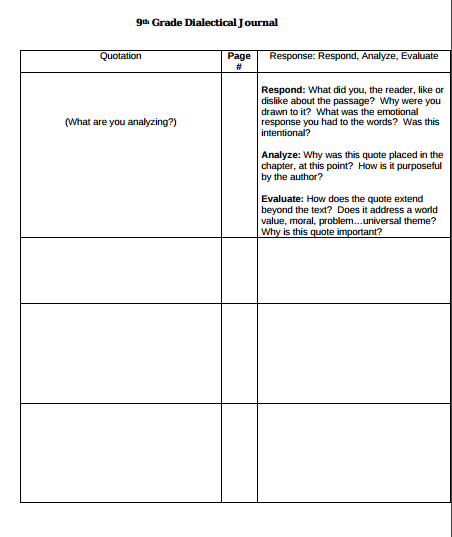
brrsd.org
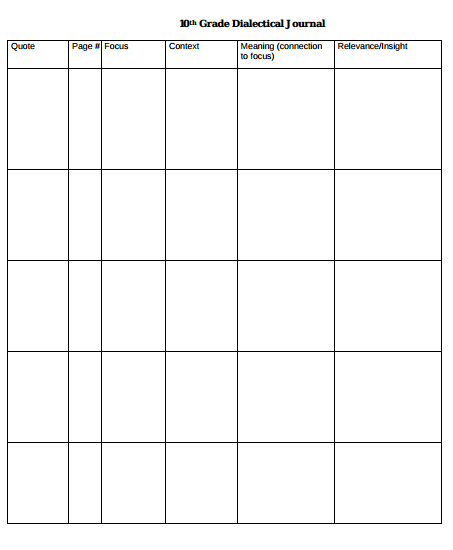
brrsd.org
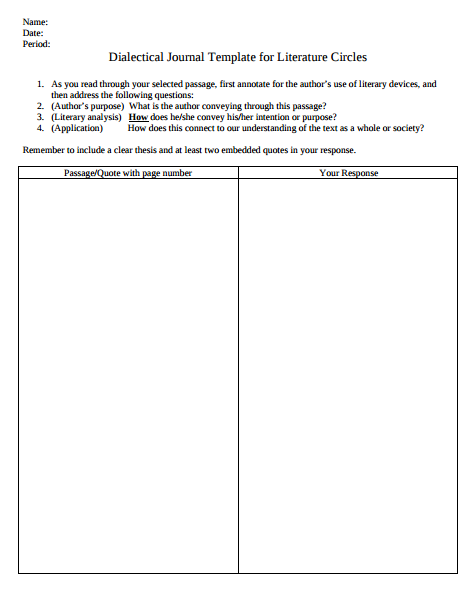
ppcsd.org
Dialectical journals are not expensive and don’t have a complicated format. In making a dialectical journal, just follow these steps:
The pages should all be empty and clean. Neatness is important in dialectical journals as a whole. If you have some used notebook paper with lots of loose leaves, tear out the ones with writings on it and leave out those that don’t have.
The left side is the passage taken from a literary piece, while the right side is the thoughts about it. Use a pen and ruler in writing the borders of the columns. On the left side, write the passage and its source material. Label it with “Readings” or ‘Passages”, so it can be easily found by anyone who reads it. The right side is labeled with “Responses”. You can also see Notebook and journal templates in illustrator.
There are several factors for choosing a passage. First, it must be something that sparks your interest. You should feel some kind of emotional attachment to it. It must remind you of your own experience in life, or something that reflects just that. Another factor for choosing a passage is something that should be a significant turn in the plot. From there, a long response can be written about it. You may also see Notebook and journal templates in publisher.
The passage is also chosen when it effectively uses literary devices that make the whole image more vivid to the imagination. Another is when a passage has a confusing setup and vocabulary. Some passages also illuminate the character and the setting of the story, and it’s a good candidate for a journal entry. Lastly, a passage that makes you see what you haven’t seen before is an excellent contender for work analysis and written response.
There are various ways of responding to a passage in dialectical journals. One thing that you should never forget in writing a response is it should be specific and detailed. You can start by giving your personal reaction to the passage and continuing on how it relates to your experiences in life. Write about how you feel about the passage. You can also discuss the character and his actions, motivations, and purpose in the story. It also includes your agreement and disagreement with the author.
You can also write a more detailed response to the passage. Connecting the passage to another text such as songs and films is a must. It also involves a sample analysis of the literary devices used in the passage and how it makes sense to the whole novel. Another way of responding to a passage is considering a perspective of a different character and seeing things differently.
Responding to the passage needs time and critical thinking. Write everything you can and make sure not to go overboard into irrelevance.
Go over your journal again and see if there are lapses. If you think there are still areas that need to be improved, do the necessary editing of your dialectical journal entry. This cuts down unnecessary sentences and makes your response more relevant and cohesive.
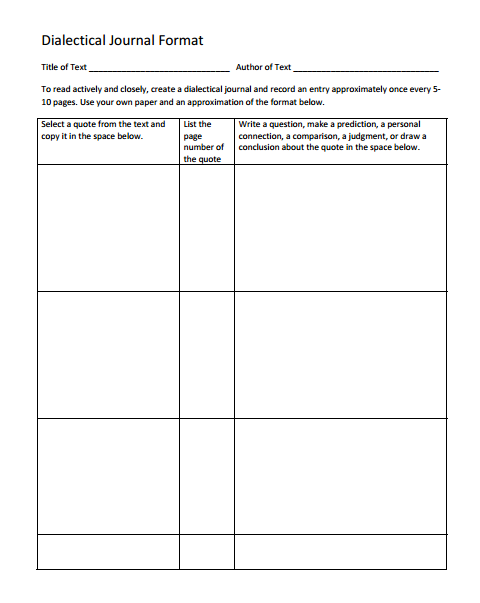
gcsblacklick.org
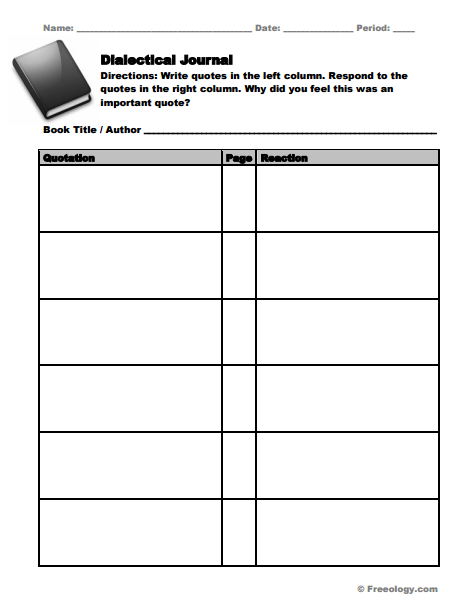
freeology.com
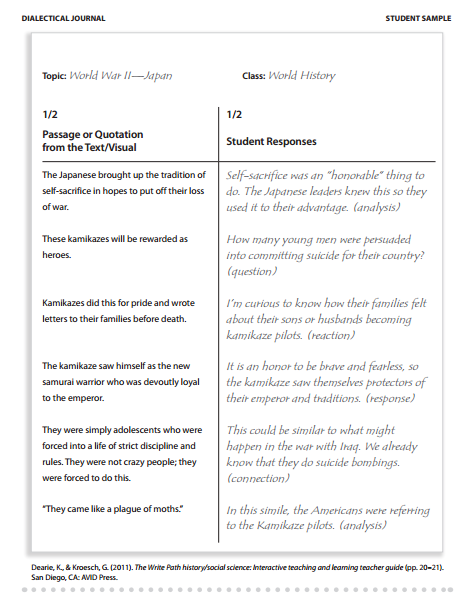
avidweekly.org
In schools, dialectical journals are given as assignments and sample project plan to students to test their critical thinking. Teachers take time in reading each journal. The guidelines for grading the dialectical journal are as follows:
Journals should be neat and legible. Students who follow the general instructions of dividing the journal into two. The journal should also be organized in order to have a good flow in reading. The pages should be numbered and the passage to be analyzed is properly cited.
Any text taken from source material should be interpreted. Interpretation means writing about your understanding of the passage. In interpreting a text vector, you should include your personal thoughts about it. Citing the use of literary devices such as theme, conflict, imagery, and point of view are also essential in making your interpretation insightful. You can connect these literary devices to your personal experiences as well.
The passages to be included should be significant to you and to the reading assignment template being given. Failure to find a significant passage might give you a failing grade. It is a must that the passage you choose is significant and relevant for you to write easily.
The sentences should be connected and related to each other. This ensures that anyone who reads your response won’t have difficulty reading it. Make sure you write and rewrite your response before submitting the final draft. There should be a smooth transition to every sentence. Avoid making the readers feel like they’re just reading random sentences stitched together for the sake of having an answer. Avoid writing vague reflections. Running around unit circles is pretty useless for journals like this.
As much as possible, be straightforward and state all your points. When you are given an assignment, make sure you cover each question and write an in-depth response to it. Put meaning in your discussions. Do not make it too long or too short. Just write what you want to write.
The response in dialectical journals contains commentary on the passage itself. The commentary should be read and identified along with the response. You can also put in your commentary the literary devices used by the author and the way he wrote the characters. Their hopes, motivations, and actions are good areas for a commentary response.
In writing, plagiarism is a big no-no. Do not ever copy someone’s work or an existing published work word for word. There are instances when another person chose the same passage as you did. It does not matter as long as the responses are different in writing, structure, and style.
Dialectical journals improve critical thinking. It conditions your mind to write relevant responses that sum up your experiences, thoughts, and arguments about the passage. It is an exercise for a more logical thinking that is needed in some aspects of life.

Accounting is a tough job to do. An accounting journal helps to ease this task a little. Such journals are…

Keeping a diary is often dismissed as a childish hobby—which can be downright insulting for those who keep a diary…
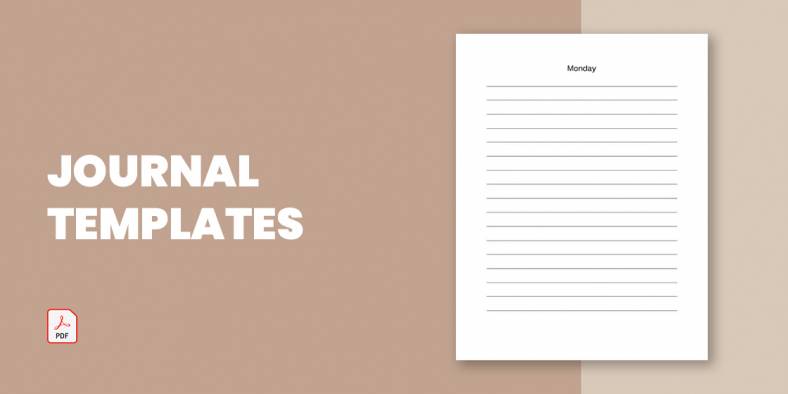
Every day is a spectacle of people, things, and events we encounter. We live to see the grandiosity of life…
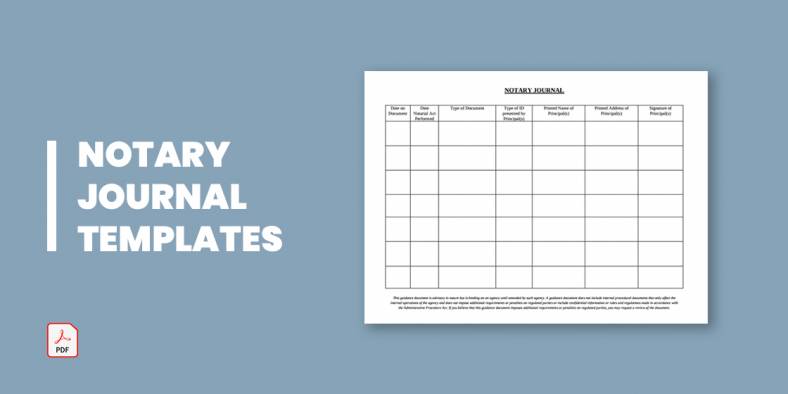
Most documents are signed to certify its effectiveness. This also builds the credibility of the document being true to its…

Critical thinking is a huge part of a person’s mental framework. It is being trained and nurtured while in school.…

Life gives us the chance to experience new things every day. The more we get to those new experiences if…

There are times when you just want to remember everything. Every fragile moment deserves to be kept inside, and you…

It is a known fact that what we do not know, one way or another, we seek to learn. It…

People in this world like to take life one day at a time and that is easy enough to understand.…